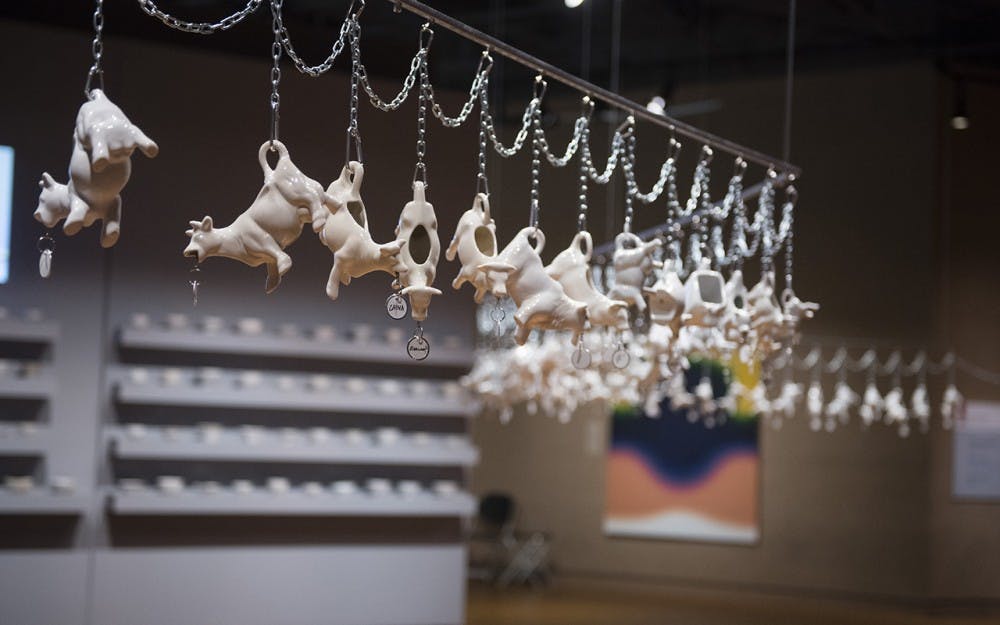The IU Eskenazi Museum of Art will close its doors this coming May for summer renovations. One of the last exhibitions on display before the summer centers on Chinese culture, specifically the experiences of immigrants, through a variety of media including video, photo and installation work.
“A Step in Time Across the Line: Recent Work by Chee Wang Ng” is the artist’s first solo museum presentation, according to the museum’s website.
Judith Ann Stubbs, the Pamela Buell curator of Asian art at the museum, said the exhibit has received generally positive feedback from the public so far.
“There seems to be a lot of appreciative comments about the show,” Stubbs said. “People seem to think it’s very moving and exciting, so that’s great.”
Immediately inside the entrance to the special exhibitions portion of the museum hangs Ng’s first piece, titled “Griefless Peace.” An image of this piece can be found on the museum’s website along with additional information about the exhibit.
Rows of Campbell’s tomato and chicken noodle soup cans stand stacked uniformly together with a single bowl of rice and matching chopsticks atop the middle cans. According to the website, this piece was largely inspired by Andy Warhol and his famous soup can photos with Ng’s infusion of Asian culture.
Another popular piece in Ng’s exhibit is “108 Global Rice Bowls.” Here, 108 porcelain rice bowls, all accompanied by a set of chopsticks, occupy multiple shelves on the museum’s wall. Overhead, a projector flashes a different picture of each of the bowls filled with rice in addition to captions indicating where each bowl was manufactured. This piece is more than just a visual experience.
A chime signifies that a new image of a bowl is being projected on the wall, but these noises aren’t arbitrary. According to Ng’s website, each clang comes from each of the bowls in the display.
“108 are the number of beads in a Buddhist rosary, a complete cycle of a prayer,” according to Ng’s website. “Chinese diaspora diverse voices sing across the globe.”
Stubbs said this piece is probably her favorite because of the many different components in it.
“I think if I had to choose, it would be the 108 rice bowls just because I like the way it looks and the sound,” Stubbs said. “I like all the parts.”
In the middle of the open exhibit room hangs the piece “In the Name of Our Forefather — Clear Tea, Light Rice.” Hanging by their tails on a metal chain alongside one another are 59 porcelain cow cream pitchers. Each pitcher has a tag indicating what country it is from. Some of the most popular places include China, Japan, France, the United States and Germany. Security guard Kevin Kleine said while monitoring the exhibit, he often sees people spend time with this piece.
“They like to count the creamers to see how many there are,” Kleine said. “There’s actually 60 — 59 of them are hung up ,and then there’s one laying on the table down there, and that’s supposed to represent actual Chinese people who don’t — who are lactose intolerant — who don’t put milk in their tea.”
The other 59 creamers symbolize countries where Chinese individuals have immigrated over the years.
While the room is lined all around with Ng’s photos, one of the last significant elements is “A Step in Time, Across the Line.” From small booties, to high heels, to life-size rain boots, this piece shows in detail, a variety of different ceramic shoes in different sizes and styles.
The wall plaque beside this component indicates one of the biggest messages in Ng’s entire exhibit: “You never truly know someone until you’ve walked a mile in their shoes.”






